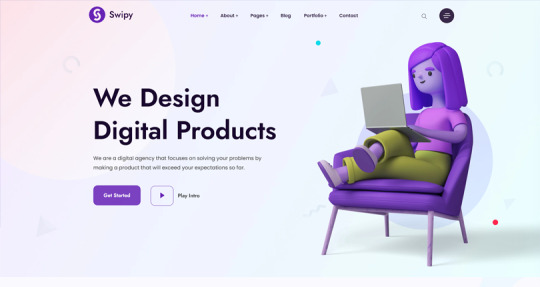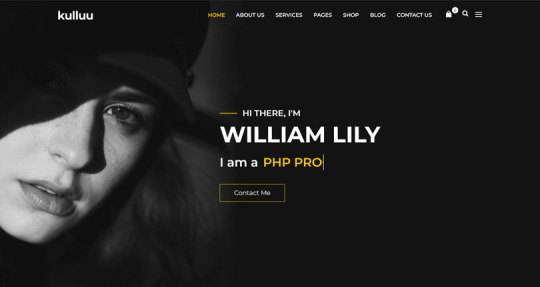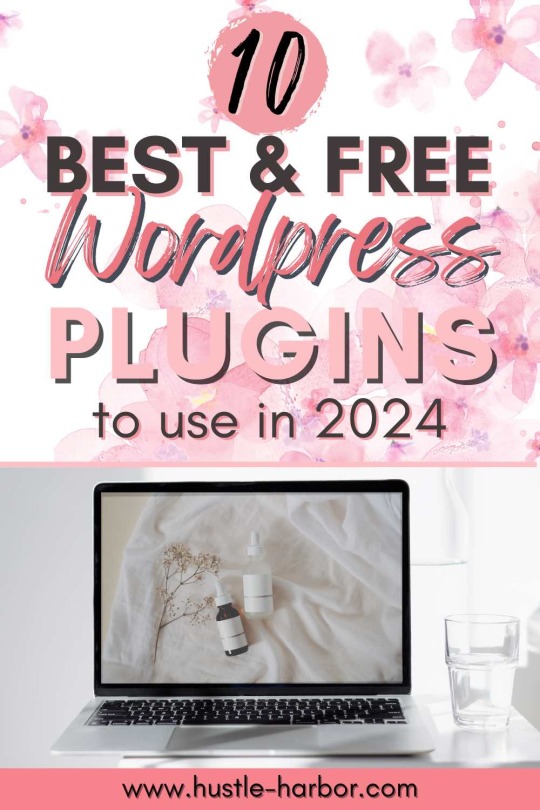#wordpress plugins for blogs
Text
7+ Best Art Portfolio Website WordPress Premium Theme

Art Portfolio Website WordPress Premium Theme
Creating an art portfolio website is essential for artists, designers, and creatives to showcase their work and attract potential clients. Let’s explore some of the best WordPress premium themes specifically designed for art portfolio websites:
1. Dabble – Creative Agency & Portfolio WordPress Theme:

A sophisticated and stylish theme with multiple menu layouts, sliders, and preset blog post styles.
Features a portfolio system using a custom post type, allowing you to display your projects effectively.
Available in both free and premium versions, with advanced controls in the premium version.
2. Rubrash – Personal Portfolio WordPress Theme:

Known for its rock-solid coding and fantastic support.
Offers full-width portfolio layouts, including checkerboard style and carousel options.
Utilize the drag-and-drop Elementor Builder to create stunning pages for each portfolio entry.
3. Swipy – Creative Agency WordPress Theme:

A flexible and feature-rich theme powered by the Elementor page builder plugin.
Suitable for various types of websites, including art portfolio website.
Explore its extensive library of over 300 templates for startups, freelancers, and personal sites.
4. Kulluu – Creative Agency WordPress Theme:

A minimalist freelancer and agency portfolio theme.
Ideal for showcasing your work with a clean and modern design.
5. Bionic- Personal Portfolio WordPress Theme:

Another portfolio WordPress theme that emphasizes simplicity.
Perfect for artists, photographers, and creative professionals.
6. Cretic – Creative Agency WordPress Theme:

A multi-concept artist and creative agency theme.
Offers versatility and a variety of options for different types of art portfolio website.
7. Mifo – Creative Minimal Portfolio WordPress Theme:

A clean and minimal multipurpose theme suitable for art portfolio website.
Focuses on elegant design and typography.
Remember to choose a theme that aligns with your artistic style, provides an excellent user experience, and effectively showcases your work. Happy creating! 🎨🖌️
For more options, you can explore other themes from ThemeForest. Each of these themes has unique features and customization options to suit your specific needs.
#premium wordpress themes#premium wordpress theme#app landing wordpress theme#wordpress premium themes#education wordpress theme#education & online course wordpress theme#paid wordpress themes#consulting business wordpress theme#online learning wordpress theme#wordpress plugins#art portfolio website#Art Portfolio Website WordPress Premium Theme#Creating an art portfolio website is essential for artists#designers#1. Dabble – Creative Agency & Portfolio WordPress Theme:#A sophisticated and stylish theme with multiple menu layouts#sliders#and preset blog post styles.#Features a portfolio system using a custom post type#allowing you to display your projects effectively.#Available in both free and premium versions#with advanced controls in the premium version.#2. Rubrash – Personal Portfolio WordPress Theme:#rubash#Known for its rock-solid coding and fantastic support.#Offers full-width portfolio layouts#including checkerboard style and carousel options.#Utilize the drag-and-drop Elementor Builder to create stunning pages for each portfolio entry.#3. Swipy – Creative Agency WordPress Theme:#swipy
2 notes
·
View notes
Text
5 Tips for Optimizing Your WordPress Website's SEO
What is SEO?

SEO or Search Engine Optimization is the process of improving your website's visibility and ranking on search engine results pages. By optimizing your WordPress website's SEO, you can increase organic traffic and attract more visitors. Various techniques and strategies can be implemented to optimize your website, such as keyword research, on-page optimization, and link building.
It is essential to regularly monitor and update your SEO efforts to stay competitive in the online market. With proper SEO optimization, your WordPress website can reach a wider audience and improve its overall performance.
Why is SEO important for WordPress websites?
When a WordPress website is optimized for SEO, it becomes more accessible to search engines, making it easier for potential visitors to find and navigate. By implementing SEO techniques such as keyword optimization, meta tags, and quality content, WordPress websites can attract organic traffic and increase their chances of appearing higher in search engine rankings.
Additionally, SEO can also enhance the user experience by improving site speed, mobile responsiveness, and overall performance. Therefore, investing time and effort into optimizing the SEO of a WordPress website is essential for driving organic traffic, increasing visibility, and ultimately achieving online success.
Benefits of optimizing your WordPress website's SEO
Optimizing your WordPress website's SEO can provide numerous benefits for your online presence. By implementing effective SEO strategies, you can improve your website's visibility in search engine results, attract more organic traffic, and increase your chances of ranking higher on search engine pages.
This can ultimately lead to increased brand exposure, higher conversion rates, and improved user experience. Additionally, optimizing your WordPress website's SEO can help you stay ahead of your competitors and establish your website as a trustworthy and authoritative source in your industry. Overall, investing time and effort into optimizing your WordPress website's SEO can yield significant long-term benefits for your business.
Tip 1: Choose the right keywords
Research relevant keywords
Researching relevant keywords is a crucial step in optimizing your WordPress website's SEO. By identifying the right keywords, you can ensure that your website appears in search engine results when users are looking for information related to your business or industry. Start by brainstorming potential keywords that are relevant to your website's content and target audience.
Then, use keyword research tools to analyze the search volume and competition for each keyword. This will help you prioritize and choose the most valuable keywords to optimize your website for. Remember to incorporate these keywords naturally into your website's content, including in page titles, headings, and meta descriptions. By conducting thorough keyword research, you can improve your website's visibility and attract more organic traffic.
Use long-tail keywords
Using long-tail keywords is crucial for optimizing your WordPress website's SEO. These are specific, longer phrases that target a niche audience and have lower competition. By incorporating long-tail keywords into your content, you can increase your website's visibility in search engine results and attract more targeted traffic. Researching and identifying relevant long-tail keywords related to your business or industry is essential for driving organic traffic and improving your website's ranking.
Make sure to strategically place these keywords in your page titles, headings, meta descriptions, and throughout your content to maximize their effectiveness.
Optimize keyword placement
Optimizing the placement of keywords is crucial for improving the SEO of your WordPress website. By strategically placing relevant keywords in your website's content, meta tags, headings, and URLs, you can increase your website's visibility in search engine results. It is important to ensure that the keywords are naturally incorporated into the content to avoid keyword stuffing, which can negatively impact your website's ranking.
Additionally, optimizing keyword placement can help search engines understand the context and relevance of your website, leading to higher organic traffic and better search engine rankings. Implementing effective keyword placement strategies is a fundamental aspect of optimizing your WordPress website's SEO.
Tip 2: Optimize your website's structure
Create a clear and logical site structure
Creating a clear and logical site structure is crucial for optimizing your WordPress website's SEO. A well-organized site structure helps search engines understand the hierarchy and relationship between different pages on your website. By organizing your content into categories and subcategories, you make it easier for search engine bots to crawl and index your site.
Additionally, a clear site structure improves user experience by making it easier for visitors to navigate through your website and find the information they are looking for. When creating your site structure, consider using descriptive and keyword-rich URLs, hierarchically organizing your content, and implementing breadcrumbs to enhance navigation.
By following these tips, you can ensure that your WordPress website is optimized for better search engine rankings and improved user experience.
Use descriptive URLs
One important tip for optimizing your WordPress website's SEO is to use descriptive URLs. Instead of using generic or random strings of characters for your URLs, make sure to include relevant keywords that accurately describe the content of the page.
This not only helps search engines understand what your page is about, but it also makes it easier for users to remember and share the URL. For example, instead of using a URL like 'www.yourwebsite.com/page123', consider using a URL like 'www.yourwebsite.com/wordpress-seo-tips'. By using descriptive URLs, you can improve the visibility and ranking of your website in search engine results, ultimately driving more organic traffic to your site.
Optimize your navigation menu
One important aspect of optimizing your WordPress website's SEO is to optimize your navigation menu. Your navigation menu is crucial for guiding visitors through your website and helping them find the information they are looking for.
To optimize your navigation menu, start by organizing your menu items logically and hierarchically. This will make it easier for both search engines and visitors to navigate your site. Additionally, ensure that your menu is easy to access and use on both desktop and mobile devices. Consider using descriptive and keyword-rich labels for your menu items to improve their visibility in search engine results.
By optimizing your navigation menu, you can enhance the user experience and improve the overall SEO performance of your WordPress website.
Tip 3: Improve your website's loading speed
Optimize image sizes
One important aspect of optimizing your WordPress website's SEO is to optimize image sizes. Large image files can slow down your website and negatively impact user experience. By resizing and compressing images, you can reduce their file size without compromising on quality.
There are several plugins available that can help you automatically optimize images on your WordPress website. Additionally, using descriptive alt text and relevant file names for your images can also improve your website's SEO by helping search engines understand what the image is about. Taking the time to optimize image sizes can greatly contribute to improving your website's overall performance and search engine rankings.
Minify CSS and JavaScript files
Minifying CSS and JavaScript files is an essential step in optimizing your WordPress website's SEO. By removing unnecessary spaces, comments, and line breaks from these files, you can reduce their file size and improve the loading speed of your website. This not only enhances the user experience but also helps search engines crawl and index your web pages more efficiently.
There are various plugins and online tools available that can automatically minify your CSS and JavaScript files, making it a hassle-free process. Implementing this optimization technique can greatly contribute to boosting your website's overall performance and search engine rankings.
Use caching plugins
One effective way to improve the performance of your WordPress website and enhance its SEO is by using caching plugins. Caching plugins help in storing the static version of your website's pages, which reduces the load time for visitors.
This is especially beneficial for managed WordPress website design, as it ensures a smoother and faster user experience. By implementing caching plugins, you can optimize your website's speed and performance, leading to better search engine rankings and increased organic traffic.
Tip 4: Create high-quality and engaging content
Write unique and valuable content
To optimize your WordPress website's SEO, it is crucial to write unique and valuable content. Search engines value originality and relevance, so make sure to create content that stands out from the competition. Focus on providing valuable information that your target audience will find helpful and engaging.
By offering unique insights and perspectives, you can establish yourself as an authority in your industry and attract more organic traffic to your website.
Additionally, remember to optimize your content with relevant keywords and meta tags to further improve your website's visibility in search engine results. Writing unique and valuable content is a fundamental aspect of SEO that can greatly impact your website's ranking and overall success.
Use relevant headings and subheadings
When optimizing your WordPress website's SEO, it is crucial to use relevant headings and subheadings. These headings not only help organize your content but also provide search engines with important information about the structure and relevance of your webpage.
By using descriptive and keyword-rich headings, you can improve the visibility of your website in search engine results and attract more organic traffic. Additionally, headings and subheadings make it easier for users to navigate your website and find the information they are looking for.
Remember to use H1 tags for main headings and H2-H6 tags for subheadings, ensuring consistency and clarity throughout your content.
Incorporate keywords naturally
One of the most important aspects of optimizing your WordPress website's SEO is to incorporate keywords naturally. Keywords are the terms or phrases that people use when searching for information on search engines.
By incorporating relevant keywords throughout your website's content, you can improve your website's visibility and increase the chances of it appearing in search engine results. However, it is important to use keywords naturally and organically, without overstuffing them in your content.
This means that you should focus on creating high-quality, informative content that is valuable to your visitors, while also including keywords strategically. By doing so, you can enhance your website's SEO and attract more organic traffic.
Tip 5: Build high-quality backlinks
Guest blogging
Guest blogging is a powerful strategy for improving the SEO of your WordPress website. By writing high-quality content for other websites in your niche, you can not only increase your visibility and reach but also build valuable backlinks to your site. When guest blogging, it's important to choose reputable websites that have a strong following and are relevant to your industry.
Additionally, make sure to include a link back to your website in your author bio or within the content itself. This will help drive traffic to your site and improve your search engine rankings. Overall, guest blogging is an effective way to enhance your WordPress website's SEO and establish yourself as an authority in your field.
Social media promotion
Social media promotion plays a crucial role in optimizing your WordPress website's SEO. By leveraging popular social media platforms such as Facebook, Twitter, and Instagram, you can increase your website's visibility and drive more traffic. Sharing engaging content, including blog posts, images, and videos, on social media channels can help attract a larger audience and generate backlinks to your website.
Additionally, actively engaging with your followers and responding to their comments and messages can improve your website's reputation and credibility. Incorporating social media promotion into your SEO strategy can significantly enhance your WordPress website's ranking and overall online presence.
Reach out to influencers
Reaching out to influencers is a crucial step in optimizing your WordPress website's SEO. Influencers have a strong online presence and a loyal following, which can greatly benefit your website's visibility and credibility. By collaborating with influencers in your industry, you can gain access to their audience and tap into their expertise.
This can result in increased website traffic, higher search engine rankings, and valuable backlinks. When reaching out to influencers, it's important to approach them with a personalized message, highlighting how their expertise aligns with your website's content. Building relationships with influencers can lead to long-term partnerships and mutual growth in the competitive world of SEO.
3 notes
·
View notes
Text

12 notes
·
View notes
Link
#places to visit#love austria#austria#marketing software#brand marketing#boost your brand#digital marketing software#social media marekting#wordpress marketing plugin#marketing plugin#marketing blog#ducks lover#ducks#mama duck#socifunnel#creative marketing software
3 notes
·
View notes
Text
WordPress plugins: A revaluation
With the advent of Google’s March update and chargeable stats for Jetpack, how can you re-optimise your WordPress plugins?
Google’s March update was a kick in the teeth for many bloggers, and to add insult to injury, along came a chargeable model for Jetpack stats. My initial reaction was to bin Jetpack altogether, it’s bloatware after all, but after I calmed down, I had a re-think. Maybe it…

View On WordPress
0 notes
Text
WP Socializer v7.7 Release
WP Socializer v7.7 is now available. This is a maintenance release that includes a number of enhancements and bug fixes. It is now available for both free and PRO versions.
Please find the changelog below. You can also follow us on Twitter for latest updates @aakashweb

✨ Changelog
New: Button to share using OS’s native share menu.
New: Line icon now supports different desktop and mobile share links.
New: Reset WP query for before printing text sharebar.
Fix: Added permission check for AJAX calls.
Fix: Minor admin UI enhancements.
Getting the update
You can update the plugin directly from your WordPress administration page by navigating to Dashboard > Updates. This applies to both free and PRO versions of the plugin.
You can also download the free version of the plugin from WordPress.org and upload it manually. For the PRO version you can follow the documentation. If you haven’t got the PRO version yet, you can get it here.
-----
This article was originally posted on Aakash Web
0 notes
Text
Crafting Tomorrow's Plugins: A Guide to 2024's Trends in WordPress Development

Introduction:
As we embark on a new journey into 2024, the realm of WordPress plugin development is poised for exciting advancements. With WordPress powering a significant portion of the web, staying informed about emerging trends is paramount for developers and website owners alike. In this comprehensive blog, we'll delve deeper into the key trends shaping WordPress plugin development in 2024, providing insights into the evolving landscape of website customization and functionality.
1. Embracing Headless WordPress:
Headless WordPress architecture, which decouples the content management system from the front-end presentation layer, continues to gain traction. In 2024, we anticipate a surge in the adoption of headless WordPress plugin development. Developers are leveraging this approach to create highly dynamic and interactive web applications, combining the robust content management capabilities of WordPress with modern JavaScript frameworks like React and Vue.js for unparalleled flexibility and performance.
2. Enhanced Security Protocols:
In light of escalating cybersecurity threats, enhancing the security of WordPress plugins remains a top priority. In 2024, we expect to witness a paradigm shift towards implementing more robust security protocols within plugins. This includes adopting industry-best encryption standards, bolstering authentication mechanisms, and implementing proactive measures such as automated vulnerability scanning to fortify websites against potential breaches and attacks.
3. Integration with AI and Machine Learning:
The integration of artificial intelligence (AI) and machine learning (ML) technologies is poised to revolutionize WordPress plugin development in 2024. Plugins leveraging AI and ML algorithms will empower website owners with advanced functionalities such as intelligent content recommendations, automated customer support through chatbots, and predictive analytics for personalized user experiences. This trend is set to redefine the way websites engage with visitors and optimize content delivery strategies.
4. Accessibility and Inclusivity Initiatives:
Accessibility and inclusivity have become paramount considerations in web development, and WordPress plugin developers are increasingly embracing these principles. In 2024, we anticipate a greater focus on implementing accessibility features within plugins to ensure that websites are usable by individuals with disabilities. This includes adhering to web content accessibility guidelines (WCAG), optimizing keyboard navigation, and enhancing compatibility with assistive technologies to foster an inclusive online environment.
5. Sustainability and Performance Optimization:
With growing concerns about environmental sustainability, WordPress plugin developers are shifting their focus towards optimizing performance and resource efficiency. In 2024, expect to see an emphasis on sustainability-driven plugin development, with a focus on minimizing carbon footprint through efficient code optimization, server resource management, and streamlined caching mechanisms. These efforts will not only enhance website performance but also contribute towards a greener and more eco-friendly web ecosystem.
6. Voice Search Integration and Conversational Interfaces:
The rise of voice search technology and conversational interfaces is reshaping user interactions with websites. In 2024, WordPress plugins will increasingly incorporate voice search capabilities and conversational UI components to facilitate seamless interactions across devices. This trend will enable website owners to deliver personalized experiences and enhance user engagement through intuitive voice-enabled interfaces.
Conclusion:
As we peer into the future of WordPress plugin development in 2024, it's evident that the landscape is evolving rapidly, driven by innovation and a relentless pursuit of excellence. By embracing headless WordPress architecture, prioritizing security measures, integrating AI and ML technologies, championing accessibility initiatives, optimizing performance for sustainability, and incorporating voice search capabilities, developers are poised to unlock new realms of possibility in website customization and functionality. By staying attuned to these emerging trends and leveraging cutting-edge technologies, WordPress plugin developers can chart a course towards creating truly transformative digital experiences that resonate with audiences across the globe.
0 notes
Text
WordPress Plug-in Hell
If you use WordPress for your blog or site, you must be careful not to overload it. Your site performance is an integral part of your Search Engine Optimization (SEO). The overload can come from using too many WordPress Plug-ins. Plug-ins are generally helpful and can be beneficial. The issue is that many plug-ins are hefty CPU or Memory users for your site.
Some examples of high usage Plug-ins…
View On WordPress
0 notes
Text

10 WordPress plugins you should use on your blog
If you use WordPress you will see lots of plugins that add functionality to your site - but not all are what you should use! Learn about the plugins you need to have. #webdesign #blogging #plugins #wordpress
0 notes
Text
The Secrets of a Skilled WordPress Designer
A WordPress designer is a skilled professional adept at crafting dynamic and visually compelling websites using the WordPress platform. With expertise in both front-end and back-end development, a WordPress design, such as Jane Web Solutions, possesses a deep understanding of the platform's functionalities and customization options. They specialise in creating responsive, user-friendly designs that align with clients' brand identities and objectives. Jane Web Solutions stands out for their proficiency in leveraging WordPress's vast plugin ecosystem, ensuring seamless integration of features for enhanced website functionality. Whether designing corporate websites, blogs, or e-commerce platforms, a WordPress design plays a crucial role in delivering tailored, aesthetically pleasing, and functional websites that cater to the unique needs of clients and provide an engaging online experience for their audiences.
Role and Responsibilities of a WordPress Designer
A WordPress designer is a crucial professional responsible for creating visually appealing and functional websites using the WordPress platform. Their primary role involves translating client requirements into engaging website designs, ensuring a seamless user experience. They collaborate with clients to understand their brand identity and objectives, integrating these elements into the overall design.
Technical Proficiency and Skills
A skilled WordPress possesses a comprehensive understanding of HTML, CSS, and JavaScript, alongside in-depth knowledge of WordPress themes, plugins, and customization options. Proficiency in graphic design tools such as Adobe Photoshop or Illustrator is often essential. This technical expertise enables them to transform creative concepts into fully functional and responsive WordPress websites.
Customization and Theme Development
A designer excels in customization, tailoring websites to meet unique client needs. They adeptly navigate theme development, ensuring that the design aligns with the client's branding while maintaining optimal performance and responsiveness across various devices. The ability to create custom themes or modify existing ones showcases their versatility in adapting to diverse project requirements.
User-Centric Design and Accessibility
An effective WordPress designes prioritises user-centric design, creating interfaces that enhance user experience and accessibility. They consider factors such as intuitive navigation, readability, and mobile responsiveness to ensure that the website engages visitors effectively. Implementing accessibility features is crucial to make the website inclusive and compliant with industry standards.
SEO Integration and Optimization
A proficient designer understands the importance of search engine optimization (SEO) for a website's visibility. They integrate SEO best practices during the design phase, optimising elements like meta tags, headers, and image alt text. This proactive approach contributes to better search engine rankings and increased online visibility for the client's website.
Client Collaboration and Communication
Successful WordPress designer prioritise effective communication and collaboration with clients. They engage in thorough consultations to grasp the client's vision, providing regular updates and seeking feedback throughout the design process. Clear communication ensures that the final product aligns with the client's expectations and goals.
Adaptability and Continuous Learning
The dynamic nature of web design and technology requires designers to stay abreast of the latest trends, updates, and tools. A commitment to continuous learning and adaptability to evolving industry standards sets apart an excellent designer. This ensures that they can leverage new features and technologies to deliver innovative and up-to-date website solutions for their clients.
Conclusion
Engaging a skilled WordPress designer is paramount for a successful online presence. A proficient designer, like XYZ WordPress Designs, brings expertise in leveraging the versatile capabilities of the WordPress platform. With a proven track record of creating visually stunning and functionally robust websites, XYZ WordPress Designs stands out for its commitment to customization, ensuring each website reflects the unique identity and goals of the client. Their proficiency in optimising for responsiveness and user experience underscores their dedication to delivering websites that not only captivate audiences but also function seamlessly across devices. By choosing XYZ WordPress Designs, clients can expect a harmonious blend of aesthetic appeal and technical excellence, resulting in a dynamic and impactful online representation tailored to their specific needs.
#a WordPress design#such as Jane Web Solutions#possesses a deep understanding of the platform's functionalities and customization options. They specialise in creating responsive#user-friendly designs that align with clients' brand identities and objectives. Jane Web Solutions stands out for their proficiency in leve#ensuring seamless integration of features for enhanced website functionality. Whether designing corporate websites#blogs#or e-commerce platforms#a WordPress design plays a crucial role in delivering tailored#aesthetically pleasing#and functional websites that cater to the unique needs of clients and provide an engaging online experience for their audiences.#Role and Responsibilities of a WordPress Designer#A WordPress designer is a crucial professional responsible for creating visually appealing and functional websites using the WordPress plat#ensuring a seamless user experience. They collaborate with clients to understand their brand identity and objectives#integrating these elements into the overall design.#Technical Proficiency and Skills#A skilled WordPress possesses a comprehensive understanding of HTML#and JavaScript#plugins#buy perfume online#A WordPress designer is a skilled professional adept at crafting dynamic and visually compelling websites using the WordPress platform. Wit#CSS#alongside in-depth knowledge of WordPress themes#and customization options. Proficiency in graphic design tools such as Adobe Photoshop or Illustrator is often essential. This technical ex#Customization and Theme Development#A designer excels in customization#tailoring websites to meet unique client needs. They adeptly navigate theme development#ensuring that the design aligns with the client's branding while maintaining optimal performance and responsiveness across various devices.#User-Centric Design and Accessibility#An effective WordPress designes prioritises user-centric design#creating interfaces that enhance user experience and accessibility. They consider factors such as intuitive navigation
0 notes
Text
0 notes
Text
Malina: Elevate Your Personal Blogging with PixoScript

In the ever-expanding world of personal blogging, finding a WordPress theme that seamlessly blends style and functionality is paramount. PixoScript, a trusted platform for GPL WordPress themes and plugins, introduces the "Malina WordPress Theme for Personal Blog," a captivating solution for individuals seeking a perfect harmony between aesthetics and user-friendly features. In this detailed review, we'll delve into the distinctive attributes, customization capabilities, and overall performance that make Malina an exemplary choice for crafting a personalized and visually appealing blog.
GPL Copyright and DMCA Compliance: PixoScript's commitment to GPL copyright and DMCA compliance sets the foundation for a secure and trustworthy environment. Users navigating through the extensive offerings at PixoScript can be confident that all themes and plugins adhere to legal standards, providing peace of mind for those exploring the potential of the Malina theme.
Scanned & Verified Security: Security is of utmost importance in the digital realm, particularly when it comes to themes and plugins. PixoScript takes user safety seriously by subjecting all products, including Malina, to thorough scanning and verification by McAfee. This meticulous approach ensures that the Malina theme is 100% secure, creating a protected space for bloggers to express themselves without worry.
Malina WordPress Theme for Personal Blog: Design and Visual Appeal: Malina immediately captures attention with its visually striking design tailored for personal blogs. The theme successfully marries modern aesthetics with user-friendly functionality. Its clean and polished layout ensures that the focus remains on personal stories and content, creating an immersive and engaging reading experience for visitors.
Customization Options: Understanding the importance of individuality, Malina offers an extensive array of customization options. The theme's user-friendly customizer empowers users to shape their blogs according to their unique style and preferences. Real-time previews make the customization process intuitive and enjoyable, allowing bloggers to bring their creative vision to life effortlessly.
Personalization and Typography: Malina goes above and beyond by offering a variety of typography options for enhanced personalization. Bloggers can choose from a diverse range of fonts, adding an extra layer of individuality to their online presence. This attention to detail fosters a truly personalized and immersive reading experience for visitors.
Featured Post Slider and Layouts: Highlighting key content becomes seamless with Malina's featured post slider, allowing bloggers to showcase their most important or recent posts prominently. The theme's multiple layouts provide flexibility, enabling users to experiment with different styles and find the one that best complements their personal brand.
SEO Optimization and Performance: Malina prioritizes not only aesthetics but also SEO optimization. Clean code and adherence to SEO best practices contribute to enhanced visibility on search engines. The theme's performance optimization ensures swift loading times, promoting a positive user experience and positively impacting SEO rankings.
Documentation and Support: Navigating the intricacies of a new theme is made easier with comprehensive documentation provided by PixoScript. Users can find detailed guidance on installation, setup, and customization. Additionally, PixoScript's responsive and reliable support is readily available to assist with any questions or issues that may arise.
Conclusion: For those venturing into the realm of personal blogging, the Malina WordPress Theme from PixoScript emerges as a beacon of creativity and functionality. Whether you're a seasoned blogger or a novice, Malina's design elegance, customization options, and commitment to performance optimization make it a stellar choice. Elevate your personal blog to new heights with Malina, available securely on PixoScript, and witness the transformation of your online presence into a captivating and personalized digital space.
#wordpress#wordpress themes#wordpress plugins#website#personal website#blog website#website design#technology#web events#wordpress development
1 note
·
View note
Link
Os 5 melhores Plugins de Notificação Push
Notificações Push no WordPress te permite alcançar o mesmo visitante diversas vezes, aumentando o engajamento.
0 notes
Text
#best free wordpress themes#best wordpress theme#best wordpress theme for blog#best wordpress themes#free wordpress theme#free wordpress themes#free wordpress themes for blogs#top 10 free wordpress themes#top wordpress themes#wordpress blog themes#wordpress theme#wordpress themes#wordpress themes and plugins#wordpress themes free
0 notes
Text
Ultimate Floating Widgets v2.8 Release
Ultimate floating widgets v2.8 is now available. This is a maintenance release that includes a number of enhancements and bug fixes. It is now available for both free and PRO versions.
Please find the changelog below. You can also follow us on Twitter for latest updates @aakashweb
✨ Changelog
Fix: Support for gradient background colors in buttons.
Fix: Dedicated close button in popup is visible on small screens.
Fix: Invalid CSS value for close button.
Fix: Button has fade in effect when auto shown.
Fix: External close button is hidden when flyout popup is in open state.
PRO: Support for WPML language location rules filter.
PRO: Posts of all status are shown in location rules.
Getting the update
You can update the plugin directly from your WordPress administration page by navigating to Dashboard > Updates. This applies to both free and PRO versions of the plugin.
You can also download the free version of the plugin from WordPress.org and upload it manually. For the PRO version you can follow the documentation. If you haven’t got the PRO version yet, you can get it here.
-----
This article was originally posted on Aakash Web
0 notes
Text
Top 10 Free Social Plugins for WordPress
These handpicked selection of the top 10 free social plugins for WordPress promises to steer your WordPress site toward a heightened social presence.
0 notes